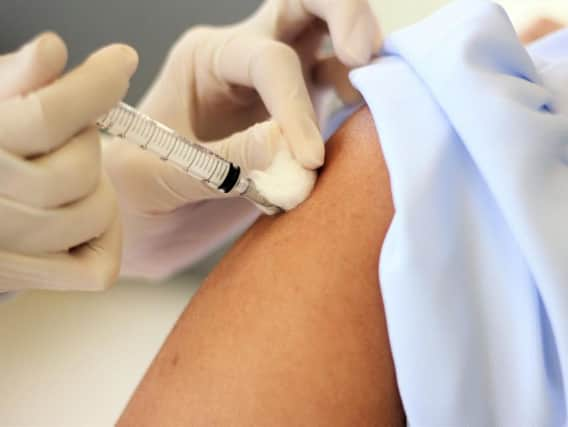Flu jab: Everything you need to know about this year's vaccination


There will be three types of vaccines available for winter 2018, including an enhanced flu jab for elderly people which will save hundred of lives this winter, according to Public Health England.
"Getting the flu vaccine is the single best way to protect yourself against this potentially fatal illness, and this year, the NHS is offering it to 24 million people across the country,” said Chief Medical Officer Prof Dame Sally Davies,
What is the new flu vaccine?


Advertisement
Hide AdAdvertisement
Hide AdThis year’s enhanced vaccine contains extra ingredients designed to help aged immune systems develop a stronger defence against flu, which is far more dangerous in old age.
The effectiveness of flu jabs declines as people get older and was effective in only one in 10 over-65s last winter.
Professor Paul Cosford, Public Health England’s medical director, said: “Flu is potentially a very serious illness, and we know adults over 65 are more likely to catch and have complications from flu so have the most to gain from an improved vaccine.
“By introducing an enhanced flu vaccine for this age group they will be better protected as well as helping to reduce the spread of flu to those around them.”
For 2018, there are 3 types of flu vaccine:
Advertisement
Hide AdAdvertisement
Hide Ad-A live quadrivalent vaccine which protects against 4 strains of flu, given as a nasal spray. This is for children and young people aged 2 to 17 years eligible for the flu vaccine.
-A quadrivalent injected vaccine. This protects against four strains of flu and is for adults aged 18 and over but below the age of 65, who are at increased risk from flu because of a long-term health condition. This is also for children 6 months and above in an eligible group who cannot receive the live vaccine
-An adjuvanted trivalent injected vaccine. This protects against 3 strains and flu and is for people aged 65 and over as it has been shown to be more effective in this age group
It is hoped that these vaccines will help ease pressures on the health service.
Public Health England estimates the vaccines will lead to:
-30,000 fewer GP appointments
-2,000 fewer people needing hospital care
-700 fewer deaths from flu
When will the flu vaccine be available?
Advertisement
Hide AdAdvertisement
Hide AdThe flu vaccine will be rolled out across the UK starting from now, with some pharmacies and surgeries already offering this year’s vaccination.
Who should get the flu vaccine?
People who are eligible for the flu vaccine this year include:
-adults aged 65 and over
-adults aged 18 to 64 with a long term health condition
-children aged 2 to 3 at their GP practice
-school children in years reception, 1, 2, 3, 4 and 5
-pregnant women
-health and social care workers
-carers
-morbidly obese people
Where can I get the flu vaccine?
You can have your NHS flu vaccine at:
-your GP surgery
-a local pharmacy offering the service
-your midwifery service if they offer it for pregnant women
Some community pharmacies now offer flu jabs to adults (but not children) at risk of flu, including pregnant women, people aged 65 and over, people with long-term health conditions and carers.
If you have your flu vaccine at a pharmacy, you don't have to inform your GP. It is up to the pharmacist to do that.